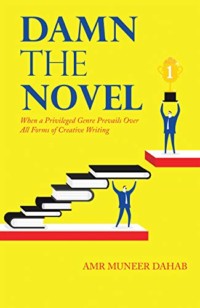Title: Damn the Novel
Author: Amr Muneer Dahab
Publisher: AuthorHouse
ISBN: 978-1-5462-7130-7
Pages: 160
Genre: Non-fiction
Reviewed by: Tara Mcnabb
Pacific Book Review
An interesting blend of Arabic literary history combined with social commentary is at the core of Amr Muneer Dahab’s provoking work titled Damn the Novel.
Fiction has always had a prominent place on the altar of literary society. Critics, historians, and enthusiasts are constantly praising the great masters of literary fiction; indeed, it sometimes seems like we would be lost without it. But this view, according to Dahab, is not only incorrect, but also dangerous. Modern society has for too long become seduced by the lies and fantasy that is fiction. Our collective obsession with the genre over all others has only served to cloud our judgment and fill our minds with fantastical ideas which have no resemblance to the real world. Dahab points out rather clearly the role that the public plays in this predicament: “The novel’s nefarious domination over the literary scene in specific and over creative writing in general couldn’t have been within reach without the collusion on the part of readers who insatiably, and without having any scruples, gobble narrative fiction, ignoring all other categories of writing and speech arts alike.” If it wasn’t for the publics insatiable desire for fiction, other literary genres would be allowed more space to flourish. Essayists, biographers, and non-fiction writers would finally have more of the spotlight and fanfare that narrative fiction seems to attract.
Focusing strongly on Arabic literature, Dahab uses examples taken from famous Arabic authors to make his arguments. This is enhanced by the detailed diversions into Arabic literary history that any student of world literature will find fascinating. Dahab isn’t afraid to criticize his peers, and he does so with very little mercy. Arabic literature, it seems, has fallen under the same spell of fiction as the West. In order for Arabic literature to once again reach its golden age, Dahab argues, it will need to severe this unhealthy obsession with fiction. There are frequent comparisons between poets and novelists; poets seem to not be quite as disdained chiefly because they are using their own voice, whereas novelists are simply hiding behind a character, according to Dahab: “The novelist is a coward because he/she hides behind an invented story to express his/her opinion.” No doubt this view is full of controversy and will cause uproar among novelists and their loyal fans.
While his views do seem harsh, Dahab makes some intriguing points about the power fiction can have over our minds, sometimes for the worse. If we are constantly living in a dreamworld, with our head in the clouds, full of fantasies, then society at large will suffer. No one will be willing to face the reality of living in a cruel and often unkind world. No one will be willing to do the work that is necessary to make things better. And although I can’t see myself ever giving up fiction, I do know that living each day with both feet planted firmly on the ground is better than living with my head in the clouds.


